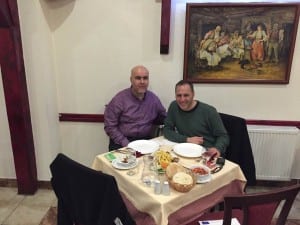FRINGE Centre blog series: I for Informality
By tjmsubl, on 9 February 2016
In our latest FRINGE Centre blog, Eric Gordy of UCL SSEES and the FRINGE Centre considers informality in the Balkans – the focus of a major new project ‘Closing the Gap between Formal and Informal Institutions in the Balkans’, which recently received a 2.4 million euros from the Horizon 2020 programme, and which is being led by Eric from UCL SSEES.
The research project on which we are now working came to life in a bar in Belgrade. I had arranged to meet my colleague in Serbia, Predrag Cvetičanin, to discuss an offer we had received to propose a work package for a Horizon 2020 proposal that was being assembled by our colleagues in economics. After looking at the general framework we decided that being the “social science on-the-side” team for a project in another discipline did not interest us, and that we would decline the offer. And probably because a few drinks had made us foolhardy, we decided that we would put together a proposal of our own (“What’s the success rate, 9%? Great!”).
We looked over the call for proposals for the topic closest to our interest, “The European Union and integration challenges in the Balkans.” The call described the problem that had to be faced in this way:
…challenges which reflect to a large extent the socio-economic, political, cultural, religious and ethnic diversity of the Balkans have to be addressed and overcome. In its attempts at supporting a transformation toward political and socio-economic stability in the Balkans, the EU is therefore faced with a high degree of complexity.
Researchers were invited to propose projects in which “EU policy options vis-à-vis each country in the Balkans and the region as a whole should be assessed, taking into account the broader geo-strategic environment.” In the end, “Research findings can ultimately be expected to identify best practices and shape the EU’s enlargement policy and strategies vis-à-vis this region and to possibly include recommendations on how to further enhance their effectiveness for the benefit of both the Balkans and the EU.”
Our first response at examining the call was to produce what Stuart Hall might have called an “oppositional” reading. Overcome the complexities of the Balkans? Not likely! Enhance the effectiveness of the EU? What effectiveness! And especially, “integration” – everybody who paid attention knew that what “integration” came down to was parliaments passing large packages of unread laws that would not be enforced and that bore no relation to life as it was really lived.
Eventually we got to the point of realizing that our resistance to the call for proposals was turning into our proposal. “European integration” fit into a series of transformations that have affected people’s lives in the region over the past one hundred years. Each of them was announced bombastically and promised to be large-scale, revolutionary and ideological in character: creation of national states, liberal and illiberal regimes, fascist and Communist regimes, ethnonational fundamentalist regimes, «integration with Europe» – all basic changes in operating principle occurring within a period that can be thought of as encompassing the lifespan and memory of a typical human being.
What do all of these transformations have in common? They are 1) strongly influenced by (political, economic, intellectual, military) currents from outside; 2) non-organic in character (imposed from above); 3) structured by a promise to be the complete opposite of what came before. We might be able to identify one more characteristic they all have in common: they have been insincerely and incompletely implemented. The above insight suggests that some part of the unusual experience of the region– ethnic fundamentalism, violence, corruption, clientelism, international tutorship, dysfunctionality – is not entirely new. It may also suggest that just like on balance the Communist ‘revolution’ did not revolutionize basic structures of informality and clientelism, it might also be the case that «European integration» revolutionizes very little. The announced transformations at the top level of politics are superficial.
Repeated and incomplete changes in institutions create a social environment in which it is difficult for people to get the work of life – access to commodities and housing, work, management of activity – accomplished through stable legal and formal means. They create a context of unpredictability, and a permanent atmosphere of institutions that if they do function, do not function the way they are described in law. In this context, how do people manage the resources necessary for survival? Everyday activity migrates from formal to informal institutions. Some of this process can be understood in terms of corruption. But in important respects the concept of corruption is too narrow to account for the scope of activity that we are discussing here. More broadly, basic everyday work is accomplished by relying on personal ties: connections of friendship, kinship, acquaintance, locality and middle-range associations (including associations like shared ethnicity and religion). Several years of research on social and cultural capital in the region indicates that material differences in the population – expressed in terms of income or property – are relatively small, and the most reliable determinant of life chances is ability to draw on social networks for help.
The research represents an effort to use insights of social science to narrow the gap between formal practices at the level of law and concrete ways in which the social world functions, and with the actual practice of power and the actual lived experience of people on the ground.
Note: This article gives the views of the author(s), and not the position of the SSEES Research blog, nor of the School of Slavonic and East European Studies, nor of UCL.
 Close
Close


